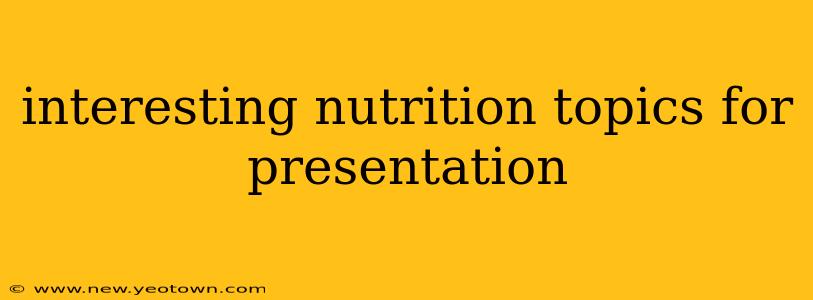Spice Up Your Life (and Your Presentation!): Interesting Nutrition Topics
Let's face it, "nutrition" can sound a bit dry. But the truth is, the world of food and its impact on our bodies is a fascinating tapestry of science, culture, and personal experience. To create a truly interesting nutrition presentation, you need a topic that sparks curiosity and offers engaging insights. Forget the boring lectures; let's dive into some captivating possibilities.
This isn't just a list; it's a journey through the delicious world of nutritional science, offering diverse avenues for exploration, tailored to different audiences and presentation styles.
I. The "Wow" Factor: Topics that Grab Attention
-
The Microbiome's Mighty Influence: Forget just vitamins and minerals; explore the incredible impact of the gut microbiome on overall health, immunity, and even mental well-being. Discuss the latest research on prebiotics, probiotics, and the role of diet in shaping this crucial ecosystem. This topic is perfect for a visually engaging presentation with colorful diagrams and compelling case studies.
-
Food as Medicine: Exploring Functional Foods: Delve into the world of functional foods – foods that provide health benefits beyond basic nutrition. Examples include berries rich in antioxidants, fatty fish brimming with omega-3s, and cruciferous vegetables packed with cancer-fighting compounds. This topic lends itself to a presentation with interactive elements, perhaps including taste tests (if appropriate) or demonstrations of preparing functional foods.
-
The Science of Satiety: Unlocking the Secrets of Feeling Full: This topic explores the complex interplay of hormones, nutrients, and psychological factors that influence appetite and fullness. Discuss the role of protein, fiber, and water in promoting satiety, and explore strategies for managing hunger cues effectively. A presentation on this could incorporate data visualizations, illustrating the effectiveness of different foods in promoting satiety.
II. Addressing Current Trends & Concerns:
-
Personalized Nutrition: The Future of Dietary Advice: Explore the emerging field of personalized nutrition, where dietary recommendations are tailored to an individual's unique genetic makeup, microbiome, and lifestyle factors. Discuss the ethical and practical challenges of this approach. This topic opens the door for a discussion-based presentation, encouraging audience participation and debate.
-
The Impact of Diet on Mental Health: The connection between gut health and mental well-being is a hot topic. Explore the role of nutrition in preventing and managing mood disorders, anxiety, and depression. This could be a compelling presentation with real-life stories and insights from experts in the field.
-
Sustainable Diets for a Healthier Planet: This timely topic explores the environmental impact of food production and consumption. Discuss strategies for adopting more sustainable diets, such as reducing meat consumption, eating locally sourced food, and minimizing food waste. This lends itself to a presentation with strong visuals, emphasizing the positive impact of sustainable choices.
III. Niche but Engaging Options:
-
The Nutritional Needs of Specific Populations: Focus on a particular group, such as athletes, pregnant women, or older adults, and discuss their unique nutritional requirements. This allows for a deep dive into a specific area, offering valuable expertise.
-
Nutritional Myths Debunked: Tackle common misconceptions surrounding diet and nutrition, using scientific evidence to clarify the truth. This can be a highly engaging presentation that empowers the audience to make informed decisions.
-
The Cultural Significance of Food and Nutrition: Explore how dietary habits and nutritional values differ across cultures, and discuss the impact of globalization on food choices and health outcomes. This could incorporate visuals of diverse cuisines and cultural traditions, making it visually rich.
Remember to tailor your chosen topic to your audience and presentation format. Use visuals, interactive elements, and real-life examples to keep your audience engaged and leave them with a deeper understanding of the fascinating world of nutrition. Good luck!

